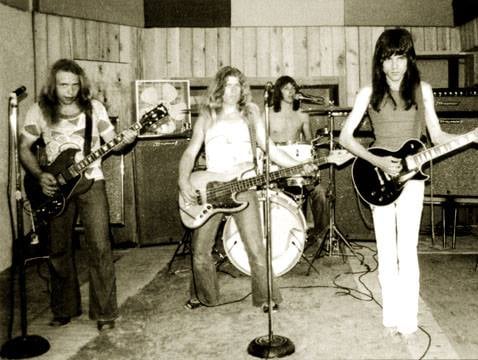October 12, 2009 – Blue Cheer bassist/vocalist Dickie Peterson died at the age of 63
OCTOBER 12, 2009 – Blue Cheer bassist/vocalist DICKIE PETERSON (b. September 12, 1946 in Grand Forks, North Dakota as Richard Allan Peterson) died at the age of 63, in Erkelenz, Germany from liver cancer, after prostate cancer spread throughout his body. He was survived by his second wife, his former wife, a daughter from his first marriage, and a six-year-old grandson. Peterson was cremated and his ashes given to his daughter, Corrina. Peterson wished his ashes to be spread in the Rhine River in Germany and in the Redwoods of Northern California, at a site to be determined by his daughter.Neil Peart, the drummer for Rush, said in tribute to Peterson: “Dickie Peterson was present at the creation — stood at the roaring heart of the creation, a primal scream through wild hair, bass hung low, in an aural apocalypse of defiant energy.
His music left deafening echoes in a thousand other bands in the following decades, thrilling some, angering others, and disturbing everything — like art is supposed to do.”Best known as the bassist and lead singer for Blue Cheer, Peterson also recorded two solo albums: “Child of the Darkness” and “Tramp.” He played bass from the age of thirteen onward, and knew at the age of eight that he wanted to become a professional musician. He came from a musical family: his father played trombone, his mother played piano and his brother, Jerry Peterson, initially played flute. Drums were Peterson’s first instrument.Peterson spent much of his youth in East Grand Forks, Minnesota, the twin city to Grand Forks, North Dakota, where he was born.
He attended Grand Forks Central High School from grade 10 through grade 12. His parents died when he was young, resulting in him living with his aunt and uncle on a farm in North Dakota, for part of his youth.Peterson cited Otis Redding as a significant influence He credited his brother, the late Jerry Peterson as being his lifelong musical influence. Jerry was one of the lead guitarists in the initial lineup of Blue Cheer (the other being Leigh Stephens) and played with various formations of the band in later years.Along with Leigh Stephens and Paul Whaley, he formed the San Francisco-based band Blue Cheer (named for a particularly potent strain of local San Francisco LSD) during the late-1960s. They enjoyed commercial success, when their edgy version of Eddie Cochran’s hit “Summertime Blues” reached #14 on the pop charts in March 1968. Between 1968 and 1971, they released six albums which included “Vincebus Eruptum” (1968), “Blue Cheer” (1969) and “New! Improved! Blue Cheer” (1970). Blue Cheer (featuring the group’s earth-shaking blues sound, featuring Peterson’s booming voice and vibrating bass licks, punctuated the psychedelic era of Bay Area acid rock) and other groups of that time which included Steppenwolf and Iron Butterfly became the forerunners of the hard rock and heavy metal music genre.Peterson moved to Sacramento in 1974, forming Peterbilt with his brother Jerre Peterson, Jay Curry on drums and Troy Spence on lead guitar. Peterbilt played club venues throughout Sacramento and across the West Coast.

For a short time, Dickie reformed Blue Cheer in 1975.In 1988, he reincarnated Blue Cheer yet again, with guitarist Andrew “Duck” MacDonald and original drummer Paul Whaley, and toured regularly throughout Europe, where he lived. The group’s live DVD, “Blue Cheer Rocks Europe,” came out in 2009. Peterson spent much of his last two decades preceding his death based in Germany, playing with Blue Cheer and other groups on occasion. In 1998 and 1999, he played various dates in Germany with the Hank Davison Band and as an acoustic duo with Hank Davison under the name “Dos Hombres” and appeared on the album “Hank Davison and Friends – Real Live.” In 2001 and 2002, Peterson played, principally in Germany, with Mother Ocean, a group he formed that included former Blue Cheer guitarist Tony Rainier, as well as brother Jerry Peterson.Throughout his life, Peterson’s relationship to music had been all-consuming. Peterson provided the following self-description: “I’ve been married twice, I’ve had numerous girlfriends, and they’ll all tell you that if I’m not playing music I am an animal to live with. … Music is a place where I get to deal with a lot of my emotion and displaced energy. I always only wanted to play music, and that’s all I still want to do.”In his early life Peterson was a user of various drugs and was a heroin addict for a number of years.
In 2007, Peterson said he believed LSD and other similar drugs can have positive effects, but that he and other members of Blue Cheer “took it over the top.” He had ceased much of his drug use by the mid-1970s, and stopped drinking ten years before his death.Blue Cheer has been considered a pioneering band in many genres. Peterson did not consider that the band belonged to any particular genre: “People keep trying to say that we’re heavy metal or grunge or punk, or we’re this or that. The reality is, we’re just a power trio, and we play ultra-blues, and it’s rock ‘n roll. It’s really simple what we do.”
SOURCES
http://www.getreadytorock.com/rock_stars/dickie_peterson.htm
https://www.findagrave.com/memorial/43031792/dickie-peterson
https://www.allmusic.com/…/blue-cheer…/biography
https://www.rollingstone.com/…/louder-than-god-rushs…/
